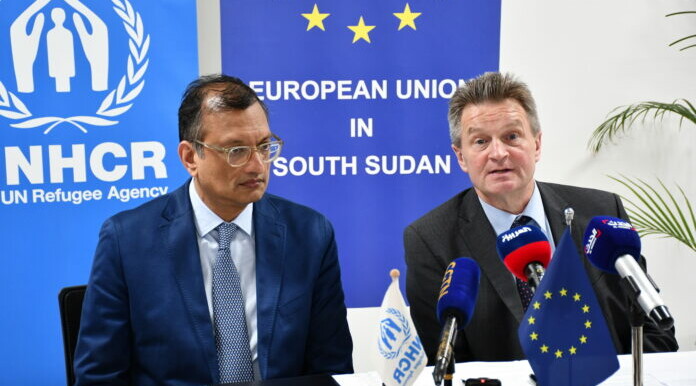The European Union (EU) has donated 25 million euros to three UN agencies, IOM, UNICEF, and WFP, to implement a three-year strategic project involving education, livelihoods, and social cohesion.
The announcement was made during a joint statement by the EU and the three UN agencies in Juba on Wednesday.
Gabriel Octavian Leonte, the Head of Cooperation at the European Union Delegation to South Sudan, said the program targets areas of displacement and return.
“The program is focusing on education, livelihoods, and community cohesion and targets in particular areas of displacement and return,” he said. “You all know that South Sudanese people despite their resilience and strength, have gone through a long period of hardships, and conflict and that caused a lot of trouble for many people and many communities.”
“We do hope that this program will provide a response to these challenges that they are facing and will empower them, be them, women, men or boys, and girls to build up resilience, to build more sustainable future for themselves,” he added.
Meanwhile, Kristina Uzelac, the Acting Head of Operations of IOM in South Sudan, said the project aims to support over 120,000 beneficiaries in three years.
“As all the three agencies are well positioned in different platforms, this will have a catalytic impact on us building synergies with other partners to move this work in South Sudan,” she stated.
On his part, Jesper Moller, the Deputy Representative of UNICEF in South Sudan, said appreciated the efforts and the emphasis of the EU delegation in South Sudan on bringing education to the citizens of the country.
“It is important to note that access to education is indeed and must be considered as a cornerstone in terms of what the future can bring for South Sudanese,” he said. “And noting the fact that at the moment we have more than 2.8 million children that are out of school in South Sudan and so the emphasis and the strategic importance of investing in children from the point of view of the European Union is very much appreciated.”
WFP’s Deputy Country Director in South Sudan, Harald Mannhardt, said the project is a great example of how entities can work together.
“We can scale up our synergies and work together going forward and improve the educational outcomes through these combined projects and through adding to the assets within the community,” he said.




